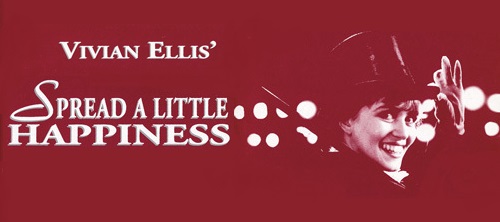Pas de biographie disponible.
Compositeur Musique additionelle Librettiste Parolier Metteur en scène Chorégraphe Producteur création Producteur version
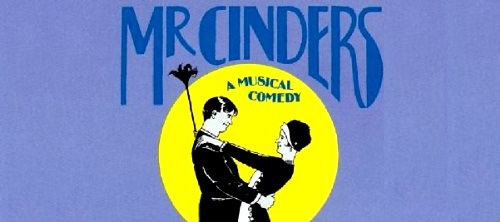
Musical
Musique: Richard Myers • Vivian Ellis • Paroles: Clifford Grey • Greatrex Newman • Livret: Production originale: 6 versions mentionnées
Dispo: Synopsis Commentaire Génèse Liste chansons
Genèse: After a tryout in Blackpool in September 1928 and three-month provincial tour, the musical opened in London at the Adelphi Theatre on 11 February 1929 and moved to the London Hippodrome on 15 July 1929. It ran for 528 performances. It starred Bobby Howes and Binnie Hale, and became a signature piece especially for Howes. The musical had immediate international success in continental Europe and elsewhere. A revival took place at the Streatham Hill Theatre in April 1930, and the show was adapted for film in 1934. The show was revived at the Fortune Theatre in April, 1983 with Denis Lawson in the title role and ran for 527 performances. When Lawson left the show Lonnie Donegan took over the part, quickly followed by Lionel Blair, but without Lawson the show soon folded. Goodspeed Opera House revived the piece in 1988. It was also revived in 1996 by the Shaw Festival, and again in 2009 by the theatre group of Emerson Jr./Sr. High School in Emerson, NJ.
Résumé:
Création: 11/2/1929 - Adelphi Theatre (Londres) - représ.
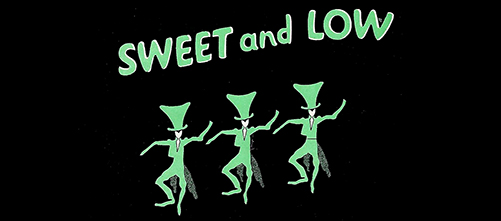
Musical
Musique: *** Divers • Harry Warren • Vivian Ellis • Paroles: *** Divers • Livret: David Freedman • Production originale: Billy Rose • 1 version mentionnée
Dispo: Génèse
"Sweet and Low" est une revue musicale produite par Billy Rose et mettant en vedette James Barton, Fanny Brice, George Jessel et Arthur Treacher. Il présente des sketches de David Freedman et des chansons de divers compositeurs et paroliers.
Genèse: The 1930 Broadway production was directed by Alexander Leftwich and choreographed by Danny Dare, with additional dances staged by Busby Berkeley. Scenic design was by Jo Mielziner. It ran for a week at the Majestic Theatre in Brooklyn before opening on November 17, 1930 at Chanin's 46th Street Theatre, where it ran for 184 performances. Although it rarely sold out, Rose transferred it to the 44th Street Theatre, where it was more successful at the box office.
Résumé:
Création: 17/11/1930 - Richard Rodgers Theatre (Broadway) - 184 représ.
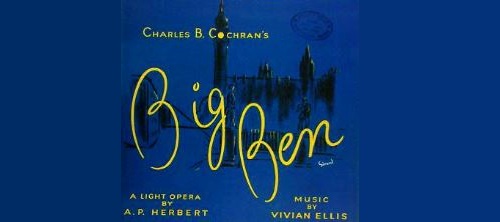
Musical
Musique: Vivian Ellis • Paroles: A.P. Herbert • Livret: A.P. Herbert • Production originale: 1 version mentionnée
Dispo: Génèse
Genèse: The pickings may be slim, but they give a fair idea of this first collaboration of A. P. Herbert and Vivian Ellis, the first of three to be handsomely produced by the great Charles B. Cochran. It briefly brightened London at the Adelphi Theatre from July 1946. The adventures of a shop girl who gets elected to the House of Commons, Big Ben was described by Ellis as 'a musical election … a light opera. [It] may not have been everyone's dish [and it clearly reflected Herbert's preoccupation as a parliamentarian] but compared with some of today's shows it had quality, as well as being near to very good indeed.' Ellis got the script in October 1945, taking it with him on the train to Margate; by the end of the journey he had the show's principal tunes: 'A huge orchestra played continuously in my head.' There is a sense of that immediacy in its songs, warm-hearted and instantly revealing their charms. The vocal selection was recorded well into the run of 172 performances, by which time both Lizbeth Webb and Noele Gordon had moved into the principal roles they had initially understudied. The team had discovered the nineteen-year old Webb, and were rewarded by a captivating performance of the principal number 'I Want To See The People Happy'; it was a sentiment and melody that seemed exactly to express the first post-war hopefulness that might be in the air. Webb would subsequently make her name in the Ellis-Herbert-Cochran Bless the Bride. On record, Miss Gordon sounds as terrifying as she was on stage towards the end of her life in a short-lived revival of Call Me Madam. The patriotism of Big Ben was not dishonest. Perhaps it was the first time in his career that Ellis had expressed that deep affinity with England that was so essential to his work.
Résumé:
Création: 17/7/1946 - Adelphi Theatre (Londres) - représ.
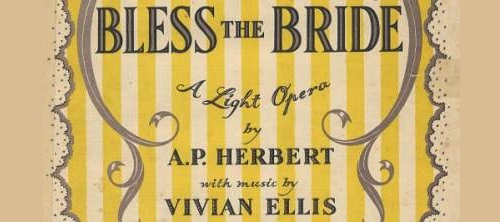
Musical
Musique: Vivian Ellis • Paroles: A.P. Herbert • Livret: A.P. Herbert • Production originale: 3 versions mentionnées
Dispo: Résumé Synopsis Génèse Liste chansons
Genèse: Bless the Bride had a friendly reception from critics and public when it opened at the Adelphi Theatre in April 1947, a few nights before Oklahoma!, and stayed for 886 performances. London took its stars, Lizbeth Webb (who had previously taken over a lead in Vivian Ellis and A. P. Herbert's Big Ben) and the handsome Greek Georges Guetary to its heart. Herbert's witty libretto followed the fortunes of Lucy Willow (Webb), engaged to but not in love with Thomas Trout (Brian Reece, who would also appear in their Tough at the Top). When she falls in love with a French actor, Pierre Fontaine, she follows him to France but returns to England when he goes to war. Believing him dead, she agrees again to marry Thomas, but Pierre returns and they are reunited. Herbert craftily highlighted the foibles of the English against the splendour of the French in a very humane work. Ellis's delightful score perfectly captured the feel of Victorian summers and the torments of true love, providing at least four outstanding songs, all of which were taken into the recording studio. When Ellis played his first version of 'Ma Belle Marguerite' to Guetary, the leading man said 'C'est magnifique, mais ce n'est pas Guetary!' 'It soon will be,' replied Ellis. In Guetary's magnificent performance it remains a classic of British musical theatre, as do 'I Was Never Kissed Before' with its enchanting snatch of Webb's spoken dialogue, and that duet so loathed by band-masters 'This Is My Lovely Day'. There is an extraordinary feeling to this lyric and its depressing melody, not surprising in a song that insists 'This is the day I will remember the day I'm dying'. If Ellis and Herbert have one song that will be immortal, 'This Is My Lovely Day' is probably it. The fourth of the numbers recorded in 1947 is Guetary's fine solo 'Table For Two', delivered in a manner that makes most modern leading men seem a poor lot. For almost half a century, beyond a disappointing studio recording headed by Mary Millar and Roberto Cardinali, this was all the gramophone could offer of Bless the Bride, until a highly distressed recording of a radio broadcast by the Adelphi Theatre's original cast was discovered in America in the early 1990s. The wonders of this recording reveal so much more of the libretto and score, with substantial dialogue and an immediate sense of theatre adding to the occasion. Guetary and Webb give performances here that are as admirable as those on the original recordings, in circumstances that allow their characters to blossom. So much is heard that was unknown, as when Guetary interrupts Webb's ecstatic rendition of 'I Was Never Kissed Before' with a middle section in which he sweeps her off her feet in a long, ringing paean of praise to her and to France: it is an enriching experience. Brian Reece is the most pleasing of second leading men, even if his character is a cad (ultimately reformed). When he refuses Lucy's invitation to play croquet she is lost for words: 'You don't like croquet. But, Thomas, how are we to occupy our leisure for the next fifty years?' At last, we are able to hear Betty Paul as Pierre's jealous friend Suzanne Valois, and it is a thrilling revelation. When she describes the terrible conditions in war-torn France, we know that hers must have been a performance of dignity and power. It provides a very rare opportunity to hear this fine artist. But the delights crowd in on all sides: the enchantment of Ellis's choruses, the Willow sisters discussing the possibilities of 'Any Man But Thomas T.', the stoic performances of Eric Fort and Edna Clement as Lucy's parents, Anona Winn as Nanny singing 'Ducky' (with melancholic wistfulness, and that nursery-like quality so typical of Ellis, recalling his revue song 'Other People's Babies'), and a finale in which the stage action comes alive. The discovery of this material is enough to make the most sceptical believe in miracles, a cause for celebrating the genius of its creators. The sound restoration is beyond praise.
Résumé: The story was set in the 1870s and told of a young girl named Lucy Veracity Willow who was about to be married to a staid young man, Hon Thomas Trout. She leaves him at the church and elopes with a debonair Frenchman, Pierre Fontaine. The couple travel to France, and are separated due to the effect of the Franco-Prussian War. Finally they find each other and return to England to marry.
Création: 26/4/1947 - Adelphi Theatre (Londres) - représ.
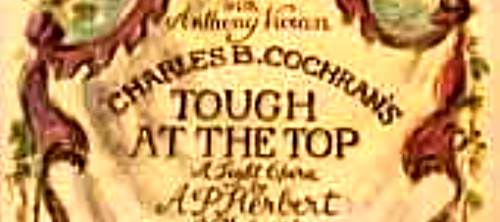
Musical
Musique: Vivian Ellis • Paroles: A.P. Herbert • Livret: A.P. Herbert • Production originale: 1 version mentionnée
Dispo: Résumé
Genèse:
Résumé: Story: Her Serene Highness Princess Philomel of Pomania, together with Barbara Duchesne, her lady-in-waiting, is visiting London and enjoying the Races, and even a boxing match, where she falls in love with Bartholomew Brain, a handsome, poetry-writing and music-loving pugilist. Away from the elegant but stuffy Pomanian Court, she manages to persuade Barbara to swap identities for a while. For dynastic reasons back home Philomel cannot consider a marriage to a British boxer - she is already promised to Count Victor of Plush, ferociously Prussian and pompous, but quite a decent chap at heart. The problem is Barbara really fancies the Count while her mistress doesn’t. Other characters in the story are Baron Theodore du Plat, the Pomanian Prime Minister, Valentine, his private secretary and Princess Selina, the Queen Mother. The English contingent includes Miss Mervin, Philomel’s English Governess and Charles Lupin of the British Foreign Office.
Création: 15/7/1949 - Adelphi Theatre (Londres) - 154 représ.
